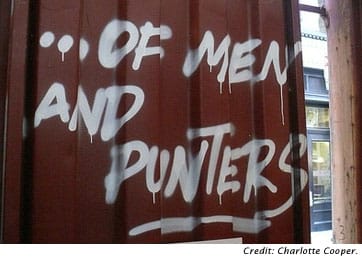
 (WOMENSENEWS)–When Marian Hatcher speaks to men who pay for sex, she tells them about the guy who used her as his punching bag for hours on end, long after she became bruised and bloodied.
(WOMENSENEWS)–When Marian Hatcher speaks to men who pay for sex, she tells them about the guy who used her as his punching bag for hours on end, long after she became bruised and bloodied.
"All he wanted to do was hit me," said Hatcher.
A college degree and 17 years of working in a corporate job didn’t make Hatcher immune to the perils of sex trafficking after an abusive marriage led her to drugs and eventually to prostitution.
"Suddenly I didn’t even know who I was," she said. "My story proves that it could happen to anyone."
Now an executive assistant to Cook County Sheriff Thomas J. Dart in the Women’s Justice Program in Chicago, Hatcher is dedicated to shifting the punishment for sex trafficking from suppliers to buyers, or "johns."
"Historically, the supplier has been the one punitively handled in the criminal justice system and the john would just get a slap on the wrist," said Hatcher.
That began to change when the first school for johns, know as the First Offender Prostitution Program, opened in San Francisco in the mid-1990s.
Today, approximately 40 john schools serving 50 communities exist nationwide. Though "john school" is the generic term for educational programs for men who engage in transactional sex, each course has its own formal title, such as Chicago’s Ammend Program.
By educating men on the consequences of soliciting sex–both for themselves and for sex workers–advocates say these programs raise awareness on the ramifications of sex trafficking and reduce recidivism. The reason behind educating men who pay for sex, says Hatcher, is simple: if there were no customers, there’d be no prostitution.
Judge Weighs Options
In Illinois, men who are arrested for soliciting sex must pay a fine of as much as $1000. It’s up to the judge to determine if men will be given the option to attend a day-long john school course and then pay a smaller fine. If they do attend the course, the arrest is expunged from their record, according Rachel Durchslag, executive director of the Chicago Alliance Against Sexual Exploitation.
The courses don’t have their own dedicated buildings and usually take place in multi-use spaces. Education varies across the country, but the core curriculum consists of information about the health and legal consequences of prostitution, the dynamics of pimping and the effects on families and communities. Survivor testimonies also figure significantly.
"You have to personalize it," said Hatcher, who always reminds men who engage in transactional sex that she could be their sister or daughter.
Legislation is also driving the shift toward combating the demand side of prostitution.
Illinois is among a handful of states with a "safe harbor" law that protects underage sex workers from legal consequences.
In Texas, the state legislature voted last month to make it a felony to force children into prostitution and to require anyone convicted of sex trafficking to register as a sex offender. The Georgia House recently voted in favor of higher fines and longer sentences for pimps and johns.
Education at john schools has also evolved, and some locations have started to focus on why men solicit prostitutes in the first place.
"What we’re seeing now is this idea of looking at constructs of masculinity," said Durchslag.
She said the schools are debunking myths linking prostitution and manliness and the fantasy notion that a "real man can have sex with beautiful woman anytime he wants."
Durchslag also noted that john schools are educating men on why most women enter prostitution. Many have limited resources and substance abuses issues, and johns perpetuate sex work as a means of supporting their habits as long as they’re waiting with their wallets.
"Maybe they’re not a physically violent john, but they’re helping a violent industry," she said. "John schools look at it [prostitution] as a male demand-driven power relationship."
Many Victims of Violence

A 2002 study published by the Center for Impact Research in Chicago found that of 222 women involved in various facets of Chicago’s prostitution industry, the vast majority were victims of some form of violence. Almost 80 percent of women on the streets reported being threatened with a weapon at least one time and half of the women working in escort services had been raped.
"Women don’t wake up when they’re 7 years old and go to school and tell the teacher, ‘I want to be a commercial sex worker,’" said Hatcher. "By and large, most women don’t want that to be their lifestyle."
The reality is that most women enter prostitution as minors. Many flee chaotic families and find themselves "cared for" by a pimp. Girls enter prostitution at an average age of 12 and pimps and johns often "count on [them] being broken," said Hatcher. Nationwide, 100,000 children who leave their homes each year are sexually exploited, according to the Bureau of Justice Statistics.
"I’m an anomaly. I had a degree. I had a supportive family. It was easier for me to stabilize when I finished our program," said Hatcher. "The norm is these women enter as children. This is all they know."
Hatcher insisted that education combined with legal consequences is the key to combating sex trafficking.
In a survey of 113 Chicago men conducted by Chicago Alliance Against Sexual Exploitation, 87 percent said that seeing their photo or name appear in a local paper would serve as a deterrent from buying sex, while only 41 percent said that being required to attend a johns course would do the same.
Focusing on the demand side of sex trafficking illustrates why it isn’t just a legal or economic problem, but a human rights issue as well. For Hatcher, one of the most important aspects of john schools is that they teach men how all women deserve to be treated.
"They are all supposed to be treated like human beings," she said.
Alizah Salario is a freelance journalist living in New York. Her work has appeared in The Daily Beast, Ms. Magazine, at the Poetry Foundation and elsewhere. She blogs at www.alizahsalario.com
Would you like to Comment but not sure how? Visit our help page at https://womensenews.org/help-making-comments-womens-enews-stories.
Would you like to Send Along a Link of This Story?
https://womensenews.org/story/prostitution-and-trafficking/110415/anti-sex-trade-turns-focus-men-who-buy-sex
The funding for Women’s eNews’ coverage of sex trafficking has been made possible through the generosity of the Embrey Family Foundation and The Body Shop.
For more information:
Chicago Alliance Against Sexual Exploitation:
http://www.caase.org/
Cook County Women’s Justice Program:
http://www.cookcountysheriff.com/womens_justice_services/wjs_main.html


